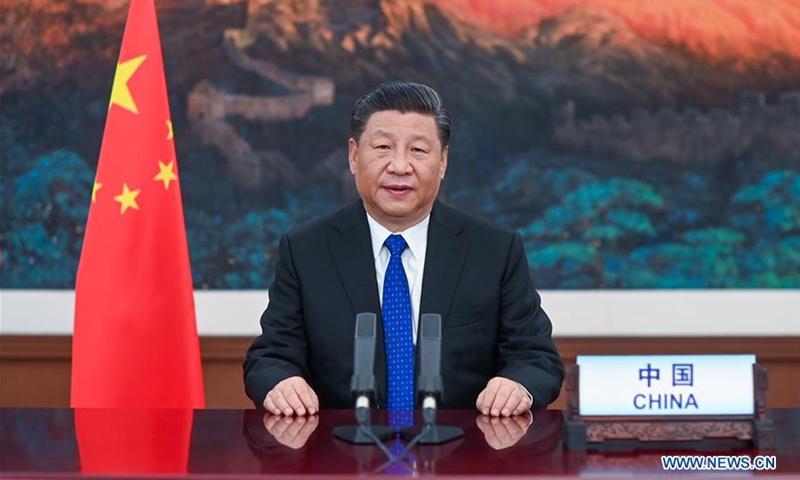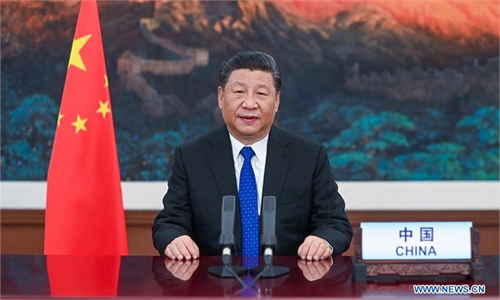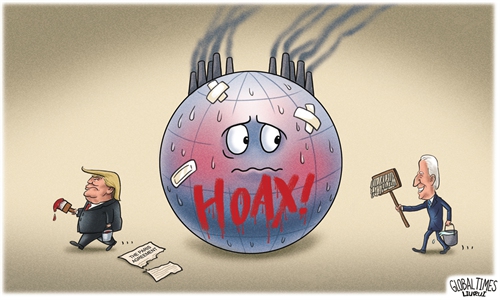Xi's attendance to Biden's climate summit shows 'goodwill gesture' but also 'a challenge to US-led climate agenda'

Photo: Xinhua
The global media spotlight will be fixed Thursday on the leaders' climate summit, hosted by the US government via video link. This will be the first meeting between Chinese President Xi Jinping and US President Joe Biden since Biden took office in January.
While Xi's confirmed attendance unleashes "a goodwill gesture" for the US-China relationship which currently faces growing challenges, Chinese experts warned that it would also be a big test for the Biden administration, casting doubts over its role as a global leader on climate change and questioning its true intention.
At Biden's invitation, Xi will attend and deliver an important speech at the leaders' climate summit on Thursday via video link from Beijing, the Chinese Foreign Ministry announced on Wednesday morning.
Chinese experts consider Xi's attendance as a move that sends positive signals for the China-US relationship, which is currently facing growing tensions on a number of questions like Xinjiang, Hong Kong and Taiwan, and is also in line with China's fundamental position on bilateral ties in seeking cooperation amid divergences.
Biden had invited 40 world leaders to attend the climate summit that is to open on Thursday, which is also Earth Day, in a bid to put the US back to the forefront of global efforts in dealing with climate change. Some major climates issues such as reducing emissions to keep a limit to warming of 1.5 C within reach, mobilizing public and private finance to drive net-zero transition and helping vulnerable countries cope with climate impacts, will spur transformational technologies that can help reduce emissions, according to an agenda released on the website of the White House.
The Chinese top leader's attendance was confirmed just one day before the summit, and also one day after Russian President Vladimir Putin confirmed he will speak at the summit, showing that the two global powers are willing to take part in global efforts to address climate issues despite US tensions with China and Russia.
Both the Chinese and Russian leaders are expected to state their firm support for upholding multilateralism on the global climate issues, firmly rejecting any form of "hegemony" or "coercion" to force other countries to accept Washington's own climate change agenda out of the US' own interests, said some Chinese experts. Just as Xi called for a new world order by saying that global affairs cannot be decided by just a few countries, and that the world wants justice, not hegemony, at the ongoing Boao Forum in South China's Hainan Province, this message would become even clearer at the upcoming US-led climate summit, according to the experts.
The US is trying to coerce China to further bring forward its schedule for the carbon emissions peak, which is pure "hegemony," Wang Yiwei, director of the Center for European Studies at Renmin University of China, told the Global Times on Wednesday.
Biden's agenda proposes to prevent average global temperatures from rising above 1.5 C, which is different from the maximum level of 2 C under the Paris Agreement, signaling the US government's apparent intention of rewriting the reached consensus and of pressuring other developing countries to step up their efforts in emissions reduction.
On the eve of the US-led summit, the EU reached a tentative climate deal that should make the 27-nation bloc climate-neutral by 2050, according to the AP. It also commits it to an intermediate target of cutting greenhouse gas emissions by at least 55 percent by 2030 compared to 1990 levels.
Meanwhile, China has already set out its own targets and road maps to achieve its climate targets by reaching its carbon emissions peak in 2030 and hitting carbon neutrality by 2060.
However, when some foreign media and scholars cast doubts on China's efforts by asking whether China has the ability to fulfill its commitment and if China should fast-forward the process, some Chinese officials and experts clarified why China needs to follow on its own agenda despite some negative voices from the West, and they stressed that China has always kept its word, and will not act like some Western countries who have low credibility.
Warning against US hegemony
As a major channel for China and the US to resume high-level talks, cooperation on the climate issues is being anticipated by officials and scholars, especially after US climate envoy John Kerry became the first senior official to visit China since Biden took office. However, Chinese experts said earlier that China is not and will not be the "attendant" of a US-centered climate campaign, as it has its own agenda and road map in pursuing climate change goals.
Chinese Vice Foreign Minister Le Yucheng already pointed out that when it comes to climate response, China is at a different stage from US and the developed European countries. "We are still a primary school student, while the US and other developed countries are already in middle school," Le said.
There is strong evidence showing that China is already making its utmost efforts. For example, from realizing peak carbon emissions to carbon neutrality it will take 30 years, but the US would take 43 years for the same goal. Meanwhile, developed countries had caused the bulk of the historical accumulation of carbon dioxide in the atmosphere.
Less than a week before the US-led climate summit, Xi held a video summit exchanging in-depth views and reaching a consensus for cooperation on climate change with French President Emmanuel Macron and German Chancellor Angela Merkel. All three countries are the most active promoters of the 2015 Paris climate accord, while the US' position was extremely unstable when former president Donald Trump was in office.
Observers noted that China and the EU are vigilant to the US tendency of using climate issues as a political tool to maintain its hegemonic status.
"The topic has been highly politicized by the US, leading China and the EU to be on high alert to the US' real strategic intentions," Wang said, citing the China-France-Germany leaders' meeting last week, which opposed exploitation of climate change as a bargaining chip for geopolitics, a target for attacking other countries, or an excuse for trade barriers.
Positive signs for China-US ties
Still, China's attendance signals that cooperation between China and the US is the mainstream tone. The agenda of the global fight against climate change should not be decided by the US, and it is necessary for China to present its solutions for other countries to evaluate which are the best for their own interests, Li Haidong, a professor at the Institute of International Relations of the China Foreign Affairs University, told the Global Times on Wednesday.
"The attendance of Chinese top leader can reassure other countries as the world anxiously needs a strong voice on this issue," Li said.
While China's participation in the upcoming summit sends a positive message, the attendance of Russian President Vladimir Putin is also seen as a sign that the Kremlin is still open to dialogue with the US, according to some media reports. However, Chinese experts believe that although the summit is being led by the US, which sets the stage for other major powers to be "led or influenced" by Biden's climate agenda, it is unlikely for the US to dominate the show.
"In its economic restructuring process, China needs to take necessary measures and take part in global discussions on climate issues, including participation in global standards on the green economy in the future," Wang said.
Strategically, the US wants to maintain its leadership after the fossil energy era, but China and Europe are highly alert because it has been clearly shown that the US cannot make consistent efforts on the climate issues, Wang noted.
The reasons are threefold. First, the US has a strong sense of priority and does not want to change its production and lifestyle. Responding to climate change has a weak public opinion base in the US, the expert further elaborated.
When it comes to whether the US can become a real leader on the global climate issues, Chinese experts have doubts. "Biden focused policies around new-energy firms which supported him, but the country's traditional energy industry is in a strong position. Conflicts among domestic interest groups will hinder the US in making changes," Wang noted.
"The nature of US election politics also determined that US strategy and policies are not consistent. This uncertainty has led to inconsistency and the world cannot believe in the US," he said.






